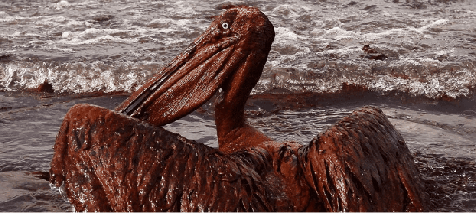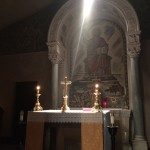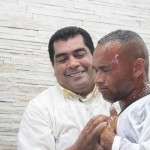
In St. Thomas Aquinas’ Adoro te Devote, we sing:
Pie Pellicane, Iesu Domine,
Me immundum munda tuo sanguine.
Cuius una stilla salvum facere
Totum mundum quit ab omni scelere.
Translation:
Lord Jesus, good Pelican,
wash me clean with your blood,
one drop of which can free
the entire world of all its sins.
Why “Jesus, good Pelican?” The Pelican has come to be a symbol of the Eucharist:
The Pelican is a symbol of the atonement and the Redeemer and is often found in Christian murals, frescos, paintings and stained glass. The pelican was believed to wound itself in order to feed its young with its own blood. In the hymn “Adoro Te,” St. Thomas Aquinas addresses the Savior with, “Pelican of Mercy, cleanse me in Thy Precious Blood.” Allusion is even made to this belief in “Hamlet” (act iv): “To his good friend thus wide I’ll ope my arms And, like the kind, life-rendering pelican, Repast them with my blood.”
This tradition and others is found in the Physiologus, an early Christian work which appeared in the second century in Alexandria, Egypt. . . . This work was noted by St. Epiphanius, St. Basil and St. Peter of Alexandria. It was also popular in the Middle Ages and was a source for the symbols used in the various stone carvings and other artwork of that period.
We see mention of the Pelican in scripture, in Psalm 102, the Domine Exaudi, the penetiential psalm of one in affliction:
I have become like a pelican in the wilderness
like an owl in desolate places.
I lie awake and I moan
like some lonely bird on a roof . . .

Nobility & Suffering//(AP Photo/Charlie Riedel)
Looking at these beautiful birds struggling to survive, covered as they are, it just brought it all to mind.
Deacon Greg says these images are timely, as the Feast of Corpus Cristi is upon us:
This lies at the heart of our lives as Catholics – this act of remembrance. Recalling and reliving this sacred moment, and cherishing what it means. What Christ offered us at the Last Supper – his body and blood – is his greatest tangible gift to the world. That is what we celebrate on this feast, Corpus Christi: the body and blood of Jesus Christ. A gift so overwhelming, and humbling. Here, the creator of everything becomes almost nothing: a slice of bread as thin as paper, to hold in our hands.
This feast is the last great Sunday celebration until November, when we mark the feast of Christ the King and prepare to begin Advent. This holy day, I think, is meant to nourish us through Ordinary Time the way the bread of life nourishes us – it is a kind of liturgical viaticum, food for the journey.
James Martin highlights Flannery O’Connor and Walter Ciszek on the Eucharist
You can hear Bruno Betinelli’s Domine Exaudi here
Oddly related beachglass from the Paragraph Farmer:
God cannot be inert. On the contrary, wrote John the Evangelist, God is love, and the essence of love is the act of self-giving. Love would have to be that way, wouldn’t it, springing as it does from the template laid down by a triune God? Some beach glass, then: who God is and what God does are inseparable, and neither part of that leaves any room for improvement.
A lover of the Pelican, who stood against the Communists in Poland, will be beatified tomorrow, on the feast of Corpus Christi, the Body of Christ.
Msgr. Charles Pope: What do you expect from Holy Communion?











